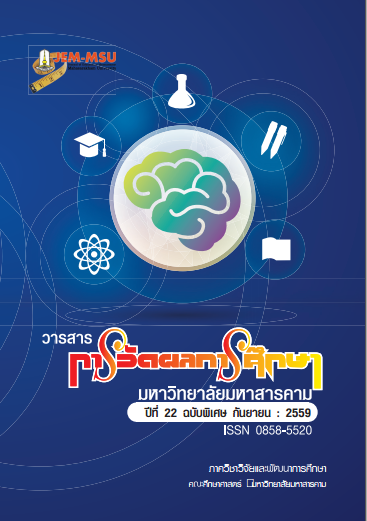The Comparison of Using the Project Approach and CIPPA Model on Learning Achievements, Science Process Skills and Scientific Problem Solving about “Life of the Plant”of Prathomsuksa 4 Students
Main Article Content
Abstract
An effective teaching model must allow the learner to learn by experiencing
and doing activities in order to develop science process skills, scientific attitude and
construct knowledge meaningfully. Thus, the purposes of this study were to examine
and compare learning achievement, basic Science Process Skills and scientific attitude of
Prathomsuksa 2 students who learned using the 7-E learning cycle model and the 4 MAT
Approaches. The sample used in this study consisted of 20 Prathomsuksa 2 (grad 2)
students attending Ban Don Rad (Chinda Witthayakarn) School, and 18 students at
Ban Han Hee Schookl, obtained using the purposive sampling technique. The instruments
used in this study were ; 1) 7-E learning plans for learning from 4.87 to 4.93 with an average
most appropriate and plans for the 4 MAT Approaches learning from 4.83 to 4.93 with an
average most appropriate, each plan for 2 hours of learning in a week. 2) a 30 item multiplechoice test on achievement with discriminating powers ranging 0.21-0.40 and a reliability
of 0.72 ; 3) a forty item multiplechoice test on basic science process skills with eight subscales,
difficulties ranging 0.47-0.85 , discriminating powers ranging 0.22-0.56 and a reliability of
0.76 ; and 4) a 20 item multiple-choice test on scientific attitudes with discriminating
powers ranging 0.22–0.78 and a reliability of 0.98. The statistics used for analyzing data
were percentage, mean and a standard deviation ; the t-test (Dependent Samples) and
Hotelling’s T2 were employed for testing hypotheses.
The results of study were as follows :
1. The plans for learning by using the 7-E learning cycle model and the 4 MAT
Approaches had efficiencies of 80.56/85.67 and 79.81/79.43 respectively.
2. The effectiveness indices of the plans for learning by using the 7-E learning
cycle model and the 4 MAT Approaches were 0.7669 and 0.6694, which indicated that two
groups of students progressed their learning at 76.69 and 66.94 percent respectively.
3. The students who learned using the 7-E learning cycle model and the 4 MAT
Approaches showed gains in learning achievement, basic science process skills and
scientific attitudes from before learning at .05 level of significance.
4. The students who learned using the 7-E learning cycle model and the 4 MAT
Approaches show learning achievement, basic science process skills and scientific attitudes
as a whole are significantly different statistically at the .05 level.
Article Details
The content and information contained in the published article in the Journal of Educational Measurement Mahasarakham University represent the opinions and responsibilities of the authors directly. The editorial board of the journal is not necessarily in agreement with or responsible for any of the content.
The articles, data, content, images, etc. that have been published in the Journal of Educational Measurement Mahasarakham University are copyrighted by the journal. If any individual or organization wishes to reproduce or perform any actions involving the entirety or any part of the content, they must obtain written permission from the Journal of Educational Measurement Mahasarakham University.

